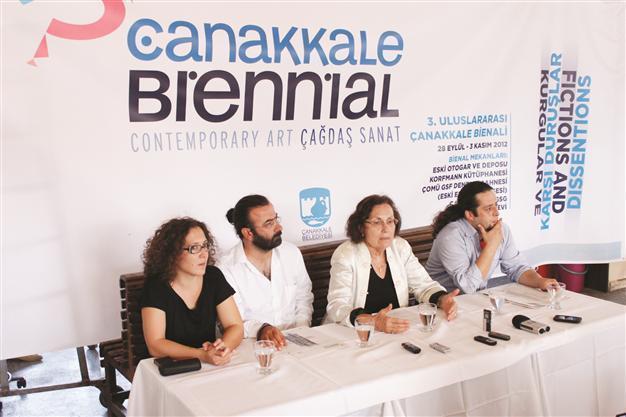Third Çanakkale Biennial takes on regional politics
ISTANBUL

The curator, Beral Madra (second rigth) says, artists today, everywhere, can and must create areas of engagement, activity and interpretation so that this can constitute an example.
In selecting work for inclusion in the Third International Çanakkale Biennial, its curators concentrated on work by artists who genuinely deal with issues in Turkish and regional politics, economic transformations and social turmoil, according to Beral Madra, a member of the curating team.
“Artists today, everywhere, can and must create areas of engagement, activity and interpretation so that this alone can constitute an example, a proof that democracy and freedom can in fact be attained on both the global and regional levels,” Madra said. “Contemporary art production, which takes its inspiration from Dada and Fluxus, has always been engaged in politics. Today it is an essential that the artist be actively engaged in ongoing events all over the world, particularly in Middle East, where the meaning of democracy and the social content of capitalism is being acknowledged as a must. It shouldn’t be a trend, but an ongoing commitment for artists.”
Today’s contemporary art is based on questioning and analysis, and is in fact a process that moves forward slowly but surely and effectively. As a result of this process, contemporary art is able to portray many intricacies and ambiguities that are a part of our seemingly ordinary daily lives. Contemporary artists work like detectives: They research the complex web of political, social, economic and cultural issues and portray them via the most effective forms and concepts.
“I always choose artwork in the context of the conceptual framework of the show. We tried to do the best with that for this show, not just myself, but as a curatorial team. Please don’t ask me to tell you which are the best [pieces in the show]; I think that is the duty of art critics… From Marwan Sahmarani, Michalengelo Pistoletto’s ‘Love Difference’ and ‘Artway of thinking,’ Julian Stallabrass to Moataz Nasr, Ulrike Rosenbach and Nikita Alexeev, from Ferhat Özgür, Fikret Atay and Sevil Tunaboylu to Neriman Polat, Mustafa Okan and Çağrı Saray, we tried to make the best possible selections,” biennial co-curator Fırat Arapoğlu.
The team was also inspired by the region of Çanakkale itself. “For instance, in Kalliopi Lemos’ work ‘Pledges for a Safe Passage,’ you can see that she is concerned with undocumented migration, which is an issue in Çanakkale and also globally. Or you can see the geo-political situation and related issues reflected in Çağrı Saray’s drawings ‘Democracy Strategies’ or in Komet’s untitled installation,” Arpaoğlu said.
The Internet’s effect on artThanks to the Internet, the network of artists in every corner of the world is capable of learning about many issues, deciphering secrets and tackling major problems concerning the whole of humanity much more quickly in this age of swift information. With this new arsenal at hand, the great myths of the past are being rewritten and the position of the post-modern individual often no longer seems relevant to the state of current events, with ripples of rebellion vibrating through Twitter and Facebook. This is a new epistemological situation that requires a new perception and appreciation.
Modern artists have always questioned conventions or rebelled against them by diving into the issues of class contradiction, ethnic identity and belief, personal identity and the concept of the other, via analytical and process-based techniques. This process opens horizons based on analysis, appreciation and comprehension of rapidly changing realities. To realize and fully comprehend space and time and to operate on political, economic and cultural levels has required of artists new ways of collaboration and partnership. Thus, the artistic initiatives of today at their best are active examples of this collaboration. These initiatives are a way of sharing experience with society.
*Hatice Utkan contributed to this article
